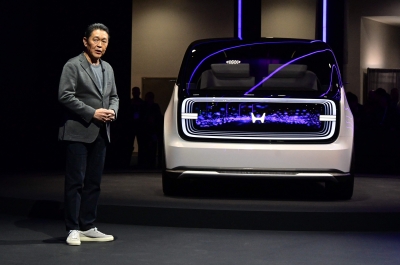LAS VEGAS, Jan 10 ― Honda yesterday unveiled a new electric vehicle series to launch commercially in 2026, revealing a futuristic concept car at the Consumer Electronics Show in Las Vegas.
“We have gone back to basics and formulated the Honda 0 Series with a design for the new era,” Shinji Aoyama, global vice president, said of the snazzy offerings.
“A bold and pure proportion that from the first glance is overwhelmingly different from other EVs to evoke a new perspective for people.”
Advertisement
The “Saloon” model features a low platform with a wide interior and sleek silhouette, with capacity to introduce “new advancements in design, automated driving, connected technologies, performance, and battery efficiency,” according to a Honda press release.
The firm plans to introduce a commercial model based on the Saloon in the United States in 2026.
The Japanese company also presented a second concept car dubbed the Space Hub that employs some of the same visual motifs as the Saloon, but in a larger form akin to the sport utility vehicles currently popular in the United States.
Advertisement
To mark a new era, Honda is tweaking its signature “H” mark from the current incarnation, which dates to 1981.
The new design evokes “two outstretched hands” to represent “Honda’s commitment to expand the possibilities of mobility and continue to meet the needs of its customers,” the company said.
Three years ago, Honda set an ambitious target of achieving 100 percent electrified vehicle sales by 2040.
The company is also working with US auto titan General Motors on a driverless taxi service.
When that plan was announced in October, “dozens” of the taxis were expected to be launched in Tokyo in early 2026.
But in an interview with Bloomberg TV in Las Vegas on Tuesday, Honda CEO Toshihiro Mibe no longer gave a specific time frame.
“We’re thinking of sometime in the late 2020s for introducing self-driving vehicles into an urban environment,” he said, according to Bloomberg.
The robotaxi project is being developed by GM’s self-driving car subsidiary Cruise, whose operations have been on hold since October 27 after California halted testing of the vehicles.
The venture has been under scrutiny since a self-driving car operated by Cruise ran over a woman who had been knocked in front of it by a hit-and-run driver in San Francisco.
In December, Cruise said it would eliminate roughly a quarter of its workforce as it slows commercialisation to address the safety issues. ― AFP







